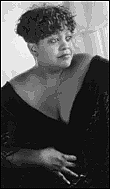|
by Paul Klemperer
 Carmen Bradford has a busy life, from teaching voice lessons at the University of Southern California, touring the U.S., Europe and Asia, writing a book on vocal technique, and working on various recording and film projects. But she loves it.
Carmen Bradford has a busy life, from teaching voice lessons at the University of Southern California, touring the U.S., Europe and Asia, writing a book on vocal technique, and working on various recording and film projects. But she loves it.
Bradford was an Austin native until the age of three, when the family moved to Los Angeles. Her father, trumpeter Bobby Bradford, played with the likes of Ornette Coleman. Carmen grew up steeped in the jazz tradition. She returned to Austin to attend Huston-Tillotson College and then got her big break with the Count Basie Orchestra, with which she toured from 1983-91.
Since then she has performed with an ever-increasing list of luminaries, including Lou Rawls, Willie Nelson and James Brown. Her rich, expressive voice and thorough command of jazz styles immediately invites comparisons to Sarah Vaughn and Ella Fitzgerald, but she has her own unmistakable style. Her experience with big band jazz makes her a much sought guest vocalist on other artists' recordings, such as George Benson's Big Boss Band, and Benny Carter's Songbook One. Her own releases include With Respect (1995) and Finally Yours (1997). She is currently working on an album of duets with pianist Shelly Berg.
It has been several years since her last Austin appearance, and when I talked with her she was happy to be coming back for the 13th Annual Austin Jazz and Arts Festival, though unfortunately it would have to be a quick visit.
ADA: Besides the concert, what do you plan to do in Austin?
CB: Go shopping! Have some barbecue, visit friends.
ADA: Has Austin changed much since you lived here?
CB: Well, I come back pretty regularly, but last time I was really shocked how much it has grown. It's different, but the musicians are still incredible. There are a lot of talented cats there.
ADA: How does Austin compare with other places you've lived and played? What do you miss?
CB: My connection to Austin. When I lived there I had my band Minor Miracle. I miss my friend "Mambo" John Treanor. I had great people in my band, like Mitch Watkins. I miss them so much. It was just a lot simpler then. You know, I got my start at Phases, in East Austin. I was so excited to make $50. I had come to study at Huston-Tillotson aaaand my parents had forbidden me to go to any clubs. Well, my third night in Austin I went with some friends to Phases. There was a disco in front, a restaurant in the middle, and a jazz lounge in the back. Once I saw the jazz band playing, I asked if I could sit in. The manager, Warren Dixon, said yes. He gave me my start.
ADA: What projects are you working on now?
CB: I'm working with my pianist Shelly Berg on a duet album. It's a mix of standards and originals and hopefully it will be out sssoon. I'll also be performing with the Paris Symphony later this year in a tribute to Charles Mingus. And I'm doing some big band shows, using the arrangements of legendary artists, like Thad Jones. As a singer, I'm fairly unique because I have such a large book of all the great big band music. I also do some commercials, and some "on camera" work. For that they don't actually use my voice, they just film me standing there.
ADA: Is it difficult to alternate touring with teaching?
CB: I give privatre vocal lessons at USC three days a week. I've been teaching there for three years. It works out because Shelly Berg is the head of Jazz Studies at USC and he's my pianist. He makes it work.
ADA: It'll be great to have you back in Austin.
CB: I'm looking forward to it.
|

 Carmen Bradford has a busy life, from teaching voice lessons at the University of Southern California, touring the U.S., Europe and Asia, writing a book on vocal technique, and working on various recording and film projects. But she loves it.
Carmen Bradford has a busy life, from teaching voice lessons at the University of Southern California, touring the U.S., Europe and Asia, writing a book on vocal technique, and working on various recording and film projects. But she loves it.